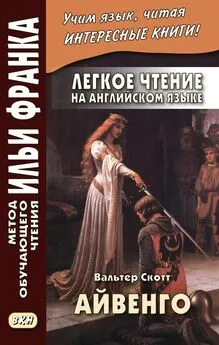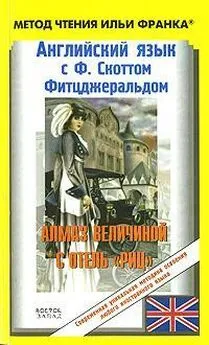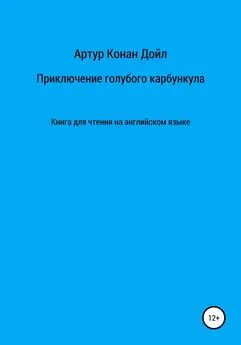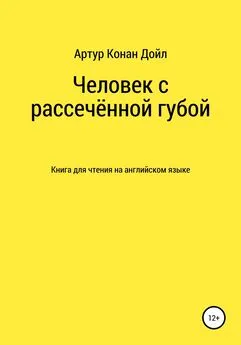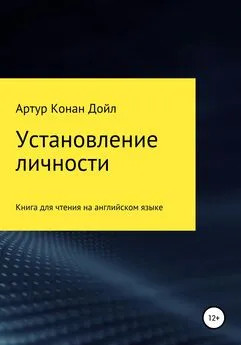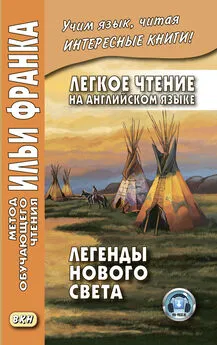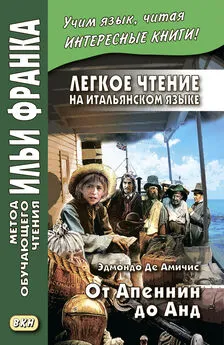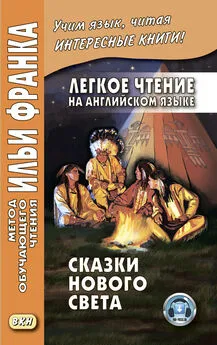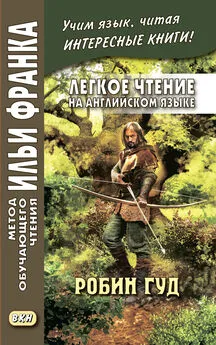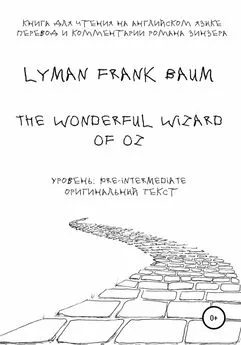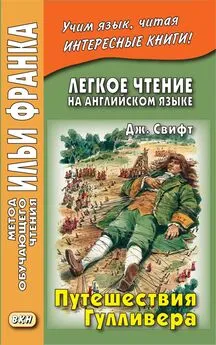Вальтер Скотт - Легкое чтение на английском языке. В. Скотт. Айвенго / Sir Walter Scott. Ivanhoe
- Название:Легкое чтение на английском языке. В. Скотт. Айвенго / Sir Walter Scott. Ivanhoe
- Автор:
- Жанр:
- Издательство:неизвестно
- Год:2022
- Город:Москва
- ISBN:978-5-7873-1910-1
- Рейтинг:
- Избранное:Добавить в избранное
-
Отзывы:
-
Ваша оценка:
Вальтер Скотт - Легкое чтение на английском языке. В. Скотт. Айвенго / Sir Walter Scott. Ivanhoe краткое содержание
Уникальность метода заключается в том, что запоминание слов и выражений происходит за счет их повторяемости, без заучивания и необходимости использовать словарь.
Пособие способствует эффективному освоению языка, может служить дополнением к учебной программе.
Для широкого круга лиц, изучающих английский язык и интересующихся английской культурой.
Легкое чтение на английском языке. В. Скотт. Айвенго / Sir Walter Scott. Ivanhoe - читать онлайн бесплатно ознакомительный отрывок
Интервал:
Закладка:
servant[‘sǝ:v(ǝ)nt] , silence[‘saɪlǝns], breathe[bri:ð]
Both of their lances broke at once, and the knights were given time to get new lances from their servants. The audience shouted wildly when they saw how well the Disinherited Knight had done, but when the knights took their places again, there was a deep silence from the galleries, as if the crowd was afraid to breathe.
This time, the Templar hit the centre of the Disinherited Knight’s shield(на этот раз храмовник ударил в центр щита рыцаря Лишенного наследства) , and he would have won the fight(и он выиграл бы поединок; to win ) if his own stirrup hadn’t broken(если бы его /собственное/ стремя не порвалось; stirrup – стремя; to break – ломать, разбивать /на части/ разрушать; разрывать ) . Instead, he was thrown off his horse(вместо этого он сам был сброшен со /своего/ коня) , and he fell onto the ground(и он упал на землю; to fall ) . Angrily, he drew his sword(гневно/яростно он вытащил свой меч; to draw – тащить, волочить; тянуть ) and waved it at the Disinherited Knight(и замахнулся им на рыцаря Лишенного наследства) , who jumped off his horse(который спрыгнул со своего коня) with his sword already in his hand(со своим мечом /уже/ в /своей/ руке).
centre[‘sentǝ] , stirrup[‘stɪrǝp] , ground[ɡraʋnd]
This time, the Templar hit the centre of the Disinherited Knight’s shield, and he would have won the fight if his own stirrup hadn’t broken. Instead, he was thrown off his horse, and he fell onto the ground. Angrily, he drew his sword and waved it at the Disinherited Knight, who jumped off his horse with his sword already in his hand.
They were stopped by two heralds(они были остановлены двумя герольдами) who reminded them(которые напомнили им; to remind – напоминать, походить; напоминать, делать напоминание ) that the rules did not allow sword-fighting(что правила не позволяли драться на мечах; sword – меч; fighting – бой, сражение ).
“We shall meet again(мы встретимся снова) where there is no one to separate us(когда не будет никого, кто смог бы помешать нам; to separate – отделять, разделять ) !” said the Templar angrily and walked back to his tent(сказал тамплиер сердито и пошел назад = вернулся к своему шатру).
remind[rɪ’maɪnd] , allow[ǝ’laʋ], fighting[‘faɪtɪŋ] , separate[‘sepǝreɪt]
They were stopped by two heralds who reminded them that the rules did not allow sword-fighting.
“We shall meet again where there is no one to separate us!” said the Templar angrily and walked back to his tent.
Prince John had no choice but to announce(у принца Джона не было никакого = другого выбора, как объявить) that the Disinherited Knight had won the first day of the tournament(что рыцарь Лишенный наследства выиграл первый день турнира).
Two heralds asked the Disinherited Knight to take off his helmet(двое герольдов попросили рыцаря Лишенного наследства снять свой шлем; to ask – спрашивать; /по/просить; to take off – убирать, уносить; снимать, сбрасывать ) in order to receive the prize from Prince John(для того, чтобы получить приз от принца Джона) , but the Disinherited Knight refused(но рыцарь Лишенный наследства отказался; to refuse – отвергать, отказывать; отказываться ) . Prince John turned to his fellow Normans in the royal gallery(принц Джон повернулся к своим друзьям-норманнам, /сидевшим/ в королевской галерее).
“Does anyone know who this proud man is(кто-нибудь знает, кто этот гордый человек) ?”
choice[tʃɔɪs] , refused[rɪ’fju:zd], proud[praʋd]
Prince John had no choice but to announce that the Disinherited Knight had won the first day of the tournament.
Two heralds asked the Disinherited Knight to take off his helmet in order to receive the prize from Prince John, but the Disinherited Knight refused. Prince John turned to his fellow Normans in the royal gallery.
“Does anyone know who this proud man is?”
“It might be the King(это может быть /сам/ король) ,” said Waldemar Fitzurse, one of Prince John’s closest allies(сказал Вальдемар Фицурс, один из ближайших союзников принца Джона; close – закрытый; близкий, интимный; неразлучный; ally – друг, союзник, сторонник ) . “It might be King Richard the Lionhearted himself(это может быть сам король Ричард Львиное Сердце; lion – лев; heart – сердце; мужество, отвага, смелость; lion-hearted – неустрашимый, отважный, смелый, храбрый ) !”
“What(что) !” Prince John exclaimed and turned as pale as death(воскликнул принц Джон и стал бледным как смерть; to turn – поворачивать; становиться, делаться; pale – бледный ) . He shook as if he had been struck by lightning(он задрожал, словно его ударила молния; to shake – трясти/сь/; встряхивать; сотрясать/ся/; качать/ся/; колебаться, вибрировать; дрожать; to strike – ударять/ся/, наносить удар, бить ).
might[maɪt], lion-hearted[,laɪǝn’hɑ:tɪd], exclaim[ɪk’skleɪm]
“It might be the King,” said Waldemar Fitzurse, one of Prince John’s closest allies. “It might be King Richard the Lionhearted himself!”
“What!” Prince John exclaimed and turned as pale as death. He shook as if he had been struck by lightning.
“It cannot be the King(это не может быть король) ,” said De Bracy calmly(сказал де Браси спокойно) . “Look at him more closely, and you will see(взгляните на него более внимательно и вы увидите; closely – близко; вплотную; внимательно, тщательно ) that your brother is a much bigger man than this knight(что ваш брат гораздо более крупный мужчина, чем этот рыцарь; big – большой, крупный ) .”
Prince John could see that this was true(принц Джон увидел, что это была правда) , and he presented the war-horse to the Disinherited Knight(и он подарил боевого коня рыцарю Лишенному наследства).
calmly[kɑ:mlɪ] , closely[‘klǝʋslɪ] , true[tru:], present[prɪ’zent]
“It cannot be the King,” said De Bracy calmly. “Look at him more closely, and you will see that your brother is a much bigger man than this knight.”
Prince John could see that this was true, and he presented the war-horse to the Disinherited Knight.
“Sir Disinherited Knight(сэр рыцарь Лишенный наследства) ,” he said, “since that is the only name by which we know you(раз это единственное имя, под которым мы знаем вас) , you may now choose the Queen of Love and Beauty(вы можете сейчас выбрать королеву любви и красоты) . If you are a stranger to our country(если вы чужак в нашей стране; stranger – иностранец, иноземец, чужестранец ) , may I suggest the daughter of one of our Norman noblemen(позвольте предложить: «могу ли я предложить» дочь одного из наших дворян-норманнов; to suggest – предлагать, советовать ) .” He hung a gold crown(он повесил золотую корону; crown – венок; венец; корона ) on the tip of the Knight’s lance(на острие рыцарского копья; tip – тонкий конец, кончик /пальца, ножа, языка и т. д./; наконечник ).
sir[sǝ] , stranger[‘streɪndʒǝ] , crown[kraʋn]
“Sir Disinherited Knight,” he said, “since that is the only name by which we know you, you may now choose the Queen of Love and Beauty. If you are a stranger to our country, may I suggest the daughter of one of our Norman noblemen.” He hung a gold crown on the tip of the Knight’s lance.
The Disinherited Knight rode straight past all of the blushing Norman ladies(рыцарь Лишенный наследства проскакал прямо мимо всех зардевшихся норманнских дам; past – мимо; blush – румянец; краска стыда, смущения; to blush – краснеть, заливаться румянцем от смущения, стыда ) and stopped in front of the Lady Rowena(и остановился перед леди Ровеной) , laying the crown at her feet(положив венец у ее ног).
“Long live the Lady Rowena, the Queen of Love and Beauty(да здравствует леди Ровена, королева любви и красоты; long live – да здравствует… ) !” shouted the tournament crowd(закричала толпа, /присутствующая/ на турнире).
As he turned to leave(когда он повернулся, чтобы уйти) , Prince John’s eyes fell on the archer(взор принца Джона упал на того самого лучника) who had made him angry earlier(который разгневал его раньше).
Читать дальшеИнтервал:
Закладка:
